Chapter VII: Duties attached to the state - building a fraternal and evangelical world
- Entire (2.26 Mo)
- Part 1 (471 Ko)
- Part 2 (471 Ko)
- Part 3 (1.46 Mo)
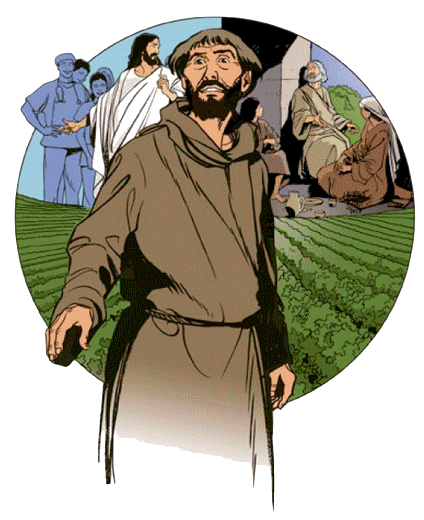 Seeing us at risk of falling into a redoubtable spiritual torpor, the Lord energetically shakes us out of it: “Go, you too, to my vineyard.” We discover to what extent this exhortation of the Lord concerns each one of us, individually as well as communally. The example of Francis will help us afterwards understand what a brother is according to the heart of God. But, we will question, why go to the Lord's vineyard? nd why build a fraternal and evangelical world? The study of several articles of our Rule (10, 14, 15 and 16) will enable us to bring a response to the real question: “to do what?” And we will see that the startling response orients all creation towards a summit, that of the coming of the reign of God.
Seeing us at risk of falling into a redoubtable spiritual torpor, the Lord energetically shakes us out of it: “Go, you too, to my vineyard.” We discover to what extent this exhortation of the Lord concerns each one of us, individually as well as communally. The example of Francis will help us afterwards understand what a brother is according to the heart of God. But, we will question, why go to the Lord's vineyard? nd why build a fraternal and evangelical world? The study of several articles of our Rule (10, 14, 15 and 16) will enable us to bring a response to the real question: “to do what?” And we will see that the startling response orients all creation towards a summit, that of the coming of the reign of God.
- 0
YOU GO INTO MY VINEYARD TOO
Let us open this chapter by meditating the text which is one of the gems of Saint Matthew’s gospel: the parable of the workers sent into the vineyard. In so doing, we will train our soul to meditate God’s Word. Indeed, when the Lord speaks to us, the Word that he pronounces is not enclosed by simple human limits. It carries us towards God’s intentions.
As a preamble to this page from the Gospel, let us recall that in Christ’s time it is not at all unusual to hire workers for the day. They are the “dailies” who receive their salary at the end of their day of work. The day is divided into twelve hours which go from six in the morning (the first hour) to six in the evening (the twelfth hour).
The parable of the workers in the vineyard
Jesus said this parable: “Now the kingdom of heaven is like a landowner going out at daybreak to hire workers for his vineyard. He made an agreement with the workers for one denarius a day and sent them to his vineyard. Going out at about the third hour he saw others standing idle in the market place and said to them, "You go into my vineyard too and I will give you a fair wage." So they went. At about the sixth hour and again at about the ninth hour, he went out and did the same.
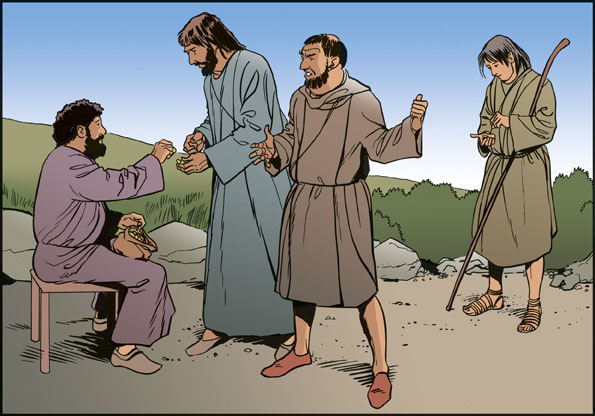 Then at about the eleventh hour he went out and found more men standing around, and he said to them, "Why have you been standing here idle all day?" "Because no one has hired us," they answered. He said to them, "You go into my vineyard too." In the evening, the owner of the vineyard said to his bailiff, "Call the workers and pay them their wages, starting with the last arrivals and ending with the first." So those who were hired at about the eleventh hour came forward and received one denarius each. When the first came, they expected to get more, but they too received one denarius each. They took it, but grumbled at the landowner saying, "The men who came last have done only one hour, and you have treated them the same as us, though we have done a heavy day's work in all the heat." He answered one of them and said, "My friend, I am not being unjust to you; did we not agree on one denarius? Take your earnings and go. I choose to pay the latecomer as much as I pay you. Have I not the right to do what I like with my own? Why should you be envious because I am generous?"
Then at about the eleventh hour he went out and found more men standing around, and he said to them, "Why have you been standing here idle all day?" "Because no one has hired us," they answered. He said to them, "You go into my vineyard too." In the evening, the owner of the vineyard said to his bailiff, "Call the workers and pay them their wages, starting with the last arrivals and ending with the first." So those who were hired at about the eleventh hour came forward and received one denarius each. When the first came, they expected to get more, but they too received one denarius each. They took it, but grumbled at the landowner saying, "The men who came last have done only one hour, and you have treated them the same as us, though we have done a heavy day's work in all the heat." He answered one of them and said, "My friend, I am not being unjust to you; did we not agree on one denarius? Take your earnings and go. I choose to pay the latecomer as much as I pay you. Have I not the right to do what I like with my own? Why should you be envious because I am generous?"
Thus the last will be first, and the first, last.
How do we decipher a parable’s messages ?
Parables are like mirrors for man: will he be hard soil or good earth for the Word? What use has he made of the talents he has received? Jesus and the presence of the kingdom in this world are secretly at the heart of the parables. One must enter the kingdom, that is, become a disciple of Christ, in order to "know the secrets of the kingdom of heaven". For those who stay "outside" (Mk 4 :11), everything remains enigmatic. * extract CCC 546.. As to the question asked of Jesus, namely why he spoke in parables, He responded to his disciples: “Because to you is granted to understand the mysteries of the kingdom of Heaven, …blessed are your eyes because they see, your ears because they hear! In truth I tell you, many prophets and upright people longed to see what you see, and never saw it; to hear what you hear, and never heard it” ( Mt 13:11-17).
Since parables are given in cryptic language, we need to :
- begin by finding the different characters in the story: who are they in relation to God, to men (and more particularly to me)?
- next, find the meaning given to other features: what does the vineyard represent, the salary, the hours, …?
- lastly find the sense of the different dialogues, the invitation, the questions. After all, what does Jesus want to tell us with this or that parable?
In answering these questions, we seek to “pierce” this parable’s mysteries so as to understand what the Lord wants to tell us, both on the spiritual plane (allegorical * the allegorical spiritual sense. Allegory is the expression of an idea through an image. Applied to God’s Word, it permits an understanding of the events proclaimed by enabling us to recognize their significance in Christ. The deliverance from Egypt told in Exodus, for example, is a sign of the deliverance from sin carried out by Christ. CCC 111 and following. and anagogical * the anagogical spiritual sense. Anagogy is the action of bringing up, it is the soul’s elevation towards heavenly things. The anagogical sense, then, consists in seeing, through God’s Word, realities and events in their eternal significance, leading us (in Greek: anagoge) thus towards the heavenly Jerusalem. CCC 111.) and on the plane of the concrete application in our lives (the moral spiritual sense * the moral spiritual sense, i.e. that which consists in leading us according to divine will. In other words, listening to God’s Word must bring about a change in our lives. To be Christian, it is not I who live, but Christ who lives in me. CCC 111 and following.).
Our vocation in everything: the beatitude of the Kingdom of Heaven
The owner who goes out at the crack of dawn is Christ. God becomes man; He “goes out” of the Kingdom of Heaven, He comes down to earth.
On earth, he calls for workers and these workers are men. He calls them, “You go into my vineyard too.” We could personalize the invitation by translating it to, “Go, you too who hear this Word of God today, to the Lord’s vineyard.”
The vineyard is the whole world. It must be transformed according to God’s purpose in view of the definitive coming of God’s Kingdom. For the final fate of us all, the objective we could say in today’s words, the salary in the parable, is indeed to be in the beatitude of the Kingdom of Heaven. There we will rest and we will see ; we will see and we will love; we will love and we will praise. That is what will be at the end without end. And what other end do we have, if not to reach the kingdom which has no end? * St. Augustine, civ. 22 :30. Let us always remember that God put us on the earth to know Him, to serve Him and to love Him. In doing this on earth, we are then granted the promise that we received from God to welcome us into his Kingdom, “Blessed are the poor in spirit, for theirs is the kingdom of heaven…Blessed are the clean of heart, for they will see God. Blessed are the peacemakers, for they will be called children of God. Blessed are they who are persecuted for the sake of righteousness, for theirs is the kingdom of heaven.
 Blessed are you when they insult you and persecute you and utter every kind of evil against you (falsely) because of me. Rejoice and be glad, for your reward will be great in heaven” (Mt 5:3-12).
Blessed are you when they insult you and persecute you and utter every kind of evil against you (falsely) because of me. Rejoice and be glad, for your reward will be great in heaven” (Mt 5:3-12).
But this Kingdom of God is not destined for me alone. The entire world is called there. Knowing that in the parable, all the hours of the day symbolize the duration of our earthly existence, some of us are called very early, i.e. in the morning of our lives (the first hour). In relation to the context of the narrative, it concerned the chosen people. More largely, it is now about all those baptized “in the arms of their parents.” Some thus are fortunate enough to be able to know, love and serve God from their earliest days. And it is for all their existence, i.e. for all “the burden of the day, with its heat”, that they are called to work in the Lord’s vineyard. The fate of birthplace (for no one chooses the family into which he is born any more than his country or religion) makes it so that for others, it is only sometime later during their lifetime that they will hear the Lord’s call, “You go into my vineyard too.” They are the workers of the third, sixth or ninth hour, hours which symbolize advancing years: twenty, forty or sixty years old. In all the cases, tirelessly, the Lord calls everyone to the Kingdom, “You go into my vineyard too.” And even to the end, to the last hour of human existence, “Finally, going out about the eleventh hour, he found others who were waiting idly there.” And he tells them, “You go into my vineyard too.” These last, to the master’s question, “Why have you been standing here idle all day?”, had answered, “Because no one has hired us.” No one, before that hour, had told them, had made known to them, that the master was hiring for the vineyard. * In his comments on this page of the Gospel, Saint Gregory the Great interprets the different hours of the call as the ages of life, “We can apply the diversity of the hours,” he said, “to the different ages of man. The morning can certainly represent, according to our interpretation, childhood. The third hour, then, can refer to adolescence; the sun has now moved to the height of heaven, that is, at this stage a person grows in strength. The sixth hour is young adulthood: the sun is in the middle of the sky, indeed at this age the fullness of vitality is obvious. Old age represents the ninth hour, because the sun starts its descent from the height of heaven, thus the youthful vitality begins to decline. The eleventh hour indicates those who are advanced in age…The workers then are called to the vineyard at different hours, as if to signify that one is called to saintliness at the time of his childhood, another in his youth, another in adulthood, and another at a more advanced age.”(St. Gregory the Great, Hom. In Evang., XIX, 2: PL 76, 1155.)
I choose to pay the latecomer as much as I pay you
This assertion of the vineyard’s owner refers to Christ’s Redemption. God made man became flesh and gave his blood for the salvation of all. None of us can call ourselves owners of Christ’s blood. No man can claim: Christ’s blood belongs to me, to me more than to you, because of my works. Christ, the day before his Passion, specifies who the recipients of his body and blood are: “Take and eat; this is my body which will be given for you… this is my blood of the covenant, which will be shed on behalf of many for the forgiveness of sins.” “The many” are us all, the poor, the little, the sinners: poor in understanding, we who look unfavorably at God’s goodness; little in that we believe we deserve first place whereas we should call ourselves useless; poor through our sins, fortunately redeemed thanks to the Son of man’s sacrifice offered to the merciful love of the Father.
The parable of the workers contains two spiritual lessons : the first is that the divine plan assures, even for the last minute converted, the reward promised by God. Testimony of such a certainty is forcefully evoked for us at the end of the dialogue between the good thief and Christ on the cross. He who is called the “good thief” is a true criminal who considers that his fate, as well that of his companion in misfortune, is justified.
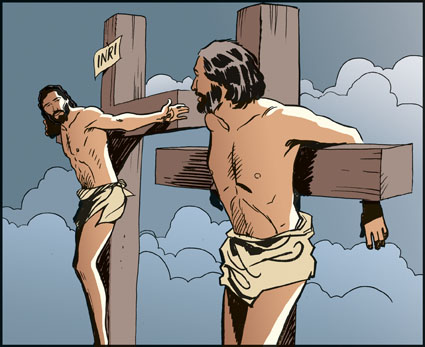 Even so, he calls out to the Savior, “Jesus, remember me when you come into your kingdom.” And Jesus replies, “Amen, I say to you, today you will be with me in Paradise.” The second lesson is that we should never murmur against God’s merciful justice. Those who thought they were entitled on account of their good works, of a whole life dedicated to justice or, more simply, because of their birth among the chosen people, continued to murmur against this divine justice which to them seemed imperfect; and so they excluded themselves: that is how the last shall be first and the first shall be last.
Even so, he calls out to the Savior, “Jesus, remember me when you come into your kingdom.” And Jesus replies, “Amen, I say to you, today you will be with me in Paradise.” The second lesson is that we should never murmur against God’s merciful justice. Those who thought they were entitled on account of their good works, of a whole life dedicated to justice or, more simply, because of their birth among the chosen people, continued to murmur against this divine justice which to them seemed imperfect; and so they excluded themselves: that is how the last shall be first and the first shall be last.
You go into my vineyard too: an invitation for me
Let us now consider this parable in our everyday lives. Going out around nine o’clock, he saw others who were there, in the square, without work. He told them, “You go into my vineyard too.” From that distant day the call of the Lord Jesus never fails to resound in the course of history. It is not only for pastors, priests and religious; it extends to all: the faithful laypeople are also personally called by the Lord, from whom they receive a mission for the Church and the world. It is addressed to every person who comes into this world. * The bulk of the text from this paragraph, as well as that of the two following paragraphs, is extracted from the apostalic exhortation of John Paul II, post synodal exhortation Christifideles laici (the lay faithful) on the vocation and mission of laypeople in the Church and around the world (Editions Pierre TEQUI 1988). Saint Gregory the Great reminds of us of it when he comments on the parable of the workers in the vineyard, “Keep watch over your manner of life, dear people, and make sure that you are indeed the Lord's laborers. Each person should take into account what he does and consider if he is laboring in the vineyard of the Lord.” * Cf. Ibid In the parable, the owner is astonished that certain people remain idle: Going out about five o'clock, he found others standing around, and said to them, “Why do you stand here idle all day?” They answered, “Because no one has hired us.” With even greater urgency the "landowner" repeats his invitation: "You go into my vineyard too". In the vineyard, where so much work awaits us, there is no room for inactivity. Is this to say that wanting to act “at all costs”, we can act irresponsibly? In practical terms, we should recall two temptations that laypeople have not always avoided: the temptation to dedicate oneself with such considerable interest in the services and tasks of the Church that we sometimes do not fulfill our specific responsibilities in regard to our family, professional, social, cultural and political life; and at the other extreme, the temptation to legitimize the unjustifiable separation of faith and everyday life, of hearing the Gospel but not connecting it to concrete action in the most varied temporal and earthly domains.
But for me, who am a layperson, where is the vineyard ?
Our Supreme Pontiff Pius XII asserts, « The faithful, and more specifically the laypeople, are in the forefront in the life of the Church; through them, the Church is the vital principle of human society. That is why they especially must always be clearly conscious not only of belonging to the Church, but of being the Church, i.e. the community of the faithful on the earth, under the direction of a common Leader, the Pope, and the Bishops in communion with him.
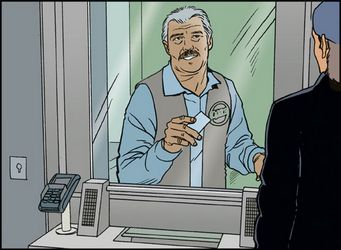 They are the Church. » * Pius XII, Speech to the new Cardinals (20 February 1946) : AAS 38 (1946), 149. Knowing that the secular character is the laity’s own and particular character, * Conc. Oecum. Vat. II, Decree on the apostalate of lay people Apostolicam actuositatem, 5. it follows that the place God calls them to must be heard in dynamic terms: in their places of study, work, there where there are amicable, social, professional, and cultural relationships. They are not asked to abandon the position they occupy in the world. Baptism, indeed, does not take them out of the world as the apostle Paul emphasizes : “Brothers, everyone should continue before God in the state in which he was called” (1 Cor 7:24). But baptism confers on them a vocation which precisely concerns their situation in the world: the faithful laity, in fact, are “called there by God that by exercising their proper function and led by the spirit of the Gospel they may work for the sanctification of the world from within as a leaven. In this way they may make Christ known to others, especially by the testimony of a life resplendent in faith, hope and charity.” * Conc.Oecum. Vat. II, Dogm. Const.on the Church Lumen gentium, 31. The Word made flesh in person wanted to enter into this game of solidarity. He sanctified those human ties, especially family ones, from which social relationships arise, willingly submitting himself to the laws of his country. He chose to lead the life of an ordinary craftsman of his own time and place.
They are the Church. » * Pius XII, Speech to the new Cardinals (20 February 1946) : AAS 38 (1946), 149. Knowing that the secular character is the laity’s own and particular character, * Conc. Oecum. Vat. II, Decree on the apostalate of lay people Apostolicam actuositatem, 5. it follows that the place God calls them to must be heard in dynamic terms: in their places of study, work, there where there are amicable, social, professional, and cultural relationships. They are not asked to abandon the position they occupy in the world. Baptism, indeed, does not take them out of the world as the apostle Paul emphasizes : “Brothers, everyone should continue before God in the state in which he was called” (1 Cor 7:24). But baptism confers on them a vocation which precisely concerns their situation in the world: the faithful laity, in fact, are “called there by God that by exercising their proper function and led by the spirit of the Gospel they may work for the sanctification of the world from within as a leaven. In this way they may make Christ known to others, especially by the testimony of a life resplendent in faith, hope and charity.” * Conc.Oecum. Vat. II, Dogm. Const.on the Church Lumen gentium, 31. The Word made flesh in person wanted to enter into this game of solidarity. He sanctified those human ties, especially family ones, from which social relationships arise, willingly submitting himself to the laws of his country. He chose to lead the life of an ordinary craftsman of his own time and place.
The evangelical images of salt, light and leaven, even though they are indiscriminately addressed to all Jesus’ disciples, apply in a quite special way to the faithful lay people. They are marvelously meaningful images because they represent not only the profound inclusion and total participation of the faithful laity in the world, but especially the novelty and originality of inclusion and participation in working towards the saving Gospel’s dissemination.
And whatever you do, in word or in deed, do everything in the name of the Lord Jesus, giving thanks to God the Father through him.
The first vocation that the Father offers each lay person in Jesus Christ through the Spirit is the vocation of holiness, i.e. of the perfection of charity. The Holy Spirit who sanctified Jesus’ human nature in Mary’s virginal womb is the same Spirit who lives and operates in the Church to communicate the holiness of the Son of God made man. And the saint is the most brilliant testimony of the dignity conferred on Christ’s disciple. Everyone in the Church, precisely because they are members, receives and so shares the common call to holiness. The faithful laity’s vocation to holiness demands that life according to the Spirit expresses itself in a particular way where they find themselves, in the temporal realities and in their participation in worldly activities. It is still the Apostle who engages us there: “And whatever you do, in word or in deed, do everything in the name of the Lord Jesus, giving thanks to God the Father through him” (Col 3:17). Applying the words of the Apostle to the faithful laity, the Council firmly asserts: “Neither family concerns nor other secular affairs should be irrelevant to their spiritual life.” * Conc.Oecum. Vat. II, Decree on the apostolate of the lay people Apostolicam actuositatem, 4. Likewise the Synod Fathers have said, “The unity of life of the lay faithful is of the greatest importance: indeed they must be sanctified in everyday professional and social life. So that they may fulfill their vocation, the lay faithful must then consider their everyday life as an opportunity for union with God and the accom-plishment of his will, in serving others and bringing them to communion with God in Christ.” * Propositio 5.

Let us conclude with this biblical image of the vineyard and vine shoots. It sum-marizes what these essential roots are, enabling each one, in communion with the rest of the vines, to bear fruit in abundance. The vine shoots’ sprouting and spread depend on their placement in the vineyard: “are the branches. Whoever remains in me and I in him will bear much fruit, because without me you can do nothing.” (John 15:4-5)
BUILDING A BROTHERLY, EVANGELICAL WORLD
Let us now go to Francis about to depart for Syria to preach Christian faith and penitence to the Saracens. What follows is extracted from Thomas of Celano’s Vita Prima. It concerns extracts from chapter 20. The first reading of this narrative may leave you puzzled. Indeed, what seems to be the chapter’s main subject (Francis’ meeting with the sultan) does not take up any more “space” than the numerous comments, apparently digressive, which precede it! We will see, however, the unity which reigns in the story and what Celano is trying to show us about Francis of Assisi’s thinking and actions.
Francis’ desire for martyrdom, journeys in Spain and Syria
 Burning with God’s love, the blessed Father Francis fervently wants to take off on great adventures, and his great heart aspires to reach the summit of perfection by following the road of God’s will. So the sixth year following his conversion, burning with the desire for martyrdom, he resolved to go to Syria to preach Christian faith and penitence to the Saracens.
Burning with God’s love, the blessed Father Francis fervently wants to take off on great adventures, and his great heart aspires to reach the summit of perfection by following the road of God’s will. So the sixth year following his conversion, burning with the desire for martyrdom, he resolved to go to Syria to preach Christian faith and penitence to the Saracens.
Francis thus leaves on a ship, but there are headwinds, and he finds himself with all the other passengers on the coast hardly 150 kilometers from the departure point; his great hopes are dashed. Francis, God Almighty’s servant, turns his back on the sea and goes to wander the earth; he works it with the plow of his word and spreads the good seed of Life which provides ample harvests; there are indeed many worthy and generous men, clerics and laity, who come to share his life. Touched by the grace of the Almighty, they want to escape the world and bravely tear themselves away from the devil. But if the evangelical tree produces a profusion of quality fruits, the sublime desire for martyrdom does not remain less fervent in Francis’ heart. So shortly thereafter he takes the road to Morocco to preach Christ’s Gospel to the Caliph and his Muslim followers. This desire which transports him is so powerful that he sometimes outstrips his travel companion and runs, drunk in the Spirit, to achieve his goal. But God, in his bounty, truly wanted to take care of me (Thomas of Celano) and of many others: Francis had already arrived in Spain when God resists him, and to stop him from going further, strikes him with a sickness which forces him to interrupt his journey.
Shortly after his return to Saint-Mary of Portiuncula, new disciples appear, noble and lettered. With his nobility of soul and his rare sense of situation, Francis knows how to receive them with honor and dignity, rendering to each his due. Gifted with an exquisite discernment, he takes into account the value and position of each one. But he finds no rest for his soul so long as he does not give free rein to his holy impulses. That is why, after the thirteenth year of his conversion, he sails for Syria where the Christians fight hard and heroically everyday against the heathens. He takes a companion with him and fearlessly leaves to confront the Sultan of the Saracens.
Who could describe the scene, Francis facing him down, intrepid, speaking with courage, responding with confidence and fervor to those who insult the religion of Christ? For he is stopped by the guards even before arriving in front of the Sultan, overwhelmed with insults and blows, but he does not tremble; he is threatened with death, he is not troubled; he is promised torture, he is not moved. Having been the plaything of so much hate, he is after all received with great courtesy by the Sultan who gives him all signs of favor and offers him numerous gifts to try to bend his soul towards the world’s wealth. But seeing that Francis vigorously rejects all his goods, he remains stunned and considers him an extraordinary man; he listens to him gladly, pierced by his words… But here again the Lord refuses to grant the saint’s desires: he reserves the right to give him the very special favor of another grace.
Conversion, prerequisite to the building of a brotherly, evangelical world
Is it not curious that Thomas of Celano situates the different events told in this narrative, not according to dates as would a historian, but uniquely in reference to an event, an event, moreover, not placed in the context of time? Thomas of Celano shares with us in this way that Francis’ first attempt to go to Syria takes place in the sixth year after his conversion. He uses the same method for the second departure for Syria, the thirteenth year after his conversion. Truth be told, it seems that the whole narrative hinges on this fact of Francis’ conversion. In this manual’s first chapter, we discovered what this event, called conversion by Thomas of Celano, consisted of in Francis’ life. It was about the meeting with the leper, and everything resulting from it.
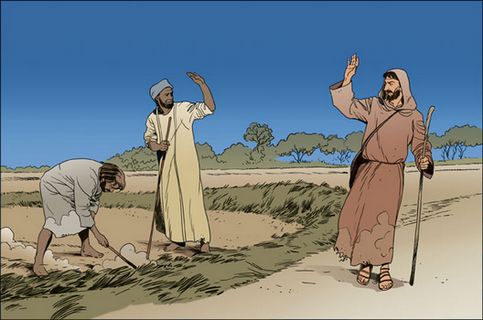 In his testimony, Francis writes about his conversion (otherwise known as penitence) by specifying its beginning: Here is how the Lord gave me, Brother Francis, the grace to begin doing penance. For Francis, it is the Lord who is at the origin of his conversion. It is He the shepherd who came to look for his lost sheep: for when I was in sin, it seemed too bitter for me to see lepers. But the Lord himself led me among them. And conversion is man’s response to God’s call which invites him to enter into communion with him. This conversion has two aspects that could be called inseparable: 1/ radical interior change that Francis summarized in his testimony by these words: And afterwards I delayed a little and left the world; 2/ and the exterior acts that conversion entails: I took care of the lepers with all my heart. Entering into communion with the Father of all men passes inevitably by doing His will.
In his testimony, Francis writes about his conversion (otherwise known as penitence) by specifying its beginning: Here is how the Lord gave me, Brother Francis, the grace to begin doing penance. For Francis, it is the Lord who is at the origin of his conversion. It is He the shepherd who came to look for his lost sheep: for when I was in sin, it seemed too bitter for me to see lepers. But the Lord himself led me among them. And conversion is man’s response to God’s call which invites him to enter into communion with him. This conversion has two aspects that could be called inseparable: 1/ radical interior change that Francis summarized in his testimony by these words: And afterwards I delayed a little and left the world; 2/ and the exterior acts that conversion entails: I took care of the lepers with all my heart. Entering into communion with the Father of all men passes inevitably by doing His will.
- With happiness, Francis paraphrases the Father’s prayer and develops, in a perfect balance and order, this double aspect of conversion when it comes to the fulfillment of the Father’s will:
- Thy will be done on earth as it is in heaven
- so that we may love you:
- with all our heart, by always having you in mind;
- with all our soul, by always longing for you;
- with all our mind, by determining to seek your glory in everything;
- and with all our strength, of body and soul, by lovingly serving you alone.
- May we love our neighbors as ourselves,
- and encourage them all to love you,
- by bearing our share in the joys and sorrows of others,
- while giving offence to no one. * Pat 5.
The narrative of Francis’ journey in Syria reported by brother Celano gives us a concrete application of this communion with our Father in heaven. Let us consider a few moments the striking lines of this story.
God’s love
The vocabulary used by brother Celano to describe the behavior of his narrative’s hero could seem exuberant: by following the road of God’s will; servant of God Almighty; drunk with the Spirit; burning with love for God; burning with a desire for martyrdom; spread the good seed of life. But when we compare these descriptions with Francis’ paraphrasing of the Our Father, we see that it is the same spiritual lifeblood which flows in both. Celano describes Francis’ character with a precision and accuracy that would put to shame the most exacting of biographers: That we love you with all our heart thinking always of you; with all our soul, desiring you always… For Francis, loving God means a total self-commitment, a boundless love.
Going towards others
May we love our neighbors as ourselves… Francis tells us in his paraphrasing. What is extraordinary about Francis is that, aware that we are all children of the same Father, he goes towards others, so as to bring them close: close to him, of course, like a brother can be; but especially close to this unique Father whose children we are.
To love his neighbors as himself : crossing the sea, wandering the earth, Francis eliminates distance. He manages to make the furthest of men become “a neighbor”. You meet the Sultan of the Saracens not by staying in the safety of your home, but by abandoning everything to meet him. Celano’s account constantly reminds us of this continual going towards others and its motivation: burning with love for God, Francis always wants to leap into great adventures; he wanders the earth; he works it with the plow of his word and spreads the good seed of Life; he resolves to go to Syria to preach the Christian faith; he takes the road to Morocco to preach Christ’s Gospel; the desire is so powerful that he runs; fearless, he leaves to confront the Sultan of the Saracens…
Francis is very concerned with loving his earthly brothers by bringing them to our Father in heaven: May we love our neighbors as ourselves, and encourage them all to love you. And this going towards others, Francis does not do it “weapons of war in hand.” He does not seek to convert at “any price,” in “any way.” But to the contrary of the crusaders of the time, and to many of God’s defenders of our time, Francis does not use swords and lances, horses and chariots, shields and armor. For Francis, to do God’s will towards all his earthly brothers is to attract them all to God’s love by sharing their joys, by helping them to support their pain, and by not doing them any harm.
Welcoming others
In this account of the journey in Syria, we wonder why Thomas of Celano tells of the new disciples’ arrival within the order of the minor brothers: in great numbers come the men, worthy and generous… many followers appear, noble and scholarly… to share his life. Would Brother Celano be so lacking in logic or analytical ability so as to make such a mistake of subject? What is the relationship between the new followers’ arrival and the journey in Syria?
In this evocation, apparently impromptu, Brother Celano relates some of Francis’ virtues in a context that he knows perfectly well having experienced it himself: …but God in his bounty wanted to take care of me and many others. The young postulant must have been charmed by the welcome that Francis had reserved for him at the time of his arrival in the order. And he was witness to the same welcome for other disciples, whose initial state of life (worthy and generous…noble and scholarly…), probably similar to his own when he first presented himself, could possibly have put off such a lover of poverty and simplicity as Francis. But Francis received them with honor and dignity, rendering to each his due. Gifted with an exquisite discernment, he takes into account the value and position of each postulant. In fact, Brother Celano enumerates Francis’ virtues in a context that he knows perfectly well, so as to suggest to the reader that these same virtues must prevail in Francis when he meets the Sultan. What Brother Thomas tells us with such confidence is that the Sultan receives Francis with much courtesy. There is, on the part of people of different race, cultures and religions, a welcome and a mutual attentive ear. Receiving and listening: these are two necessary virtues to the peacemaker, two virtues which give witness to the building of a fraternal world… But before this, Francis and his companion go through some difficult times.
Arrest by the guards : the servant is tested
All the preceding events are wonderful and even exemplary! We would all like to experience and play a part in these types of situations. We would then be active peacemakers. Who knows, we might then be known, recognized and even adulated throughout the world for having accomplished such works. Does not glory have many friends? Nevertheless let us remember Francis’ fifth admonition. He invites us all to avoid pride in ourselves but rather to place our pride in the cross of the Lord. Moreover Christ’s servant is called to follow the Master even in trials and tribulations. This is the cross of Christ’s disciples: If they persecuted me, they will persecute you too (John 15:20). And when one is called Francis, this testing through trial and tribulation is sought after, desired above all else: …burning with desire for martyrdom; …the sublime desire of martyrdom did not remain less fervent in Francis’ heart.
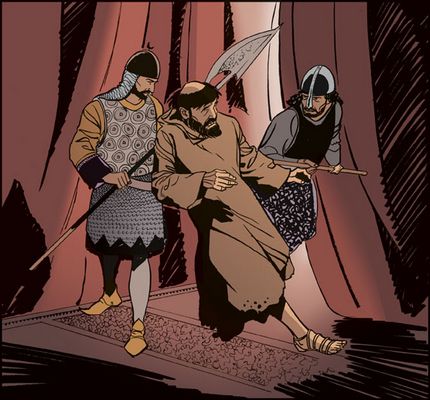
Preparation for the departure to Syria and the welcome of the new disciples are the events which also prepare the meeting with the Sultan. Despite appearances which might make us think that the meeting with the Sultan constitutes the most important part of the narrative, it is, in fact, the arrest by the guards and what then happens which is the point of the text. In Francis’ eyes (and in the eyes of the Church) martyrdom is the full imitation of Christ, the complete participation in his testimony and in his work of salvation. However, in this episode, as happens to every disciple of Christ, Francis is the world’s plaything: he is arrested by the guards, heaped with insults and blows, threatened with death and torture… Here he imitates Christ’s humility and undergoes the same indignities. This is the precursor of another grace, which Celano’s epilogue speaks of, the receiving of the stigmatas: he reserved the right to grant him the very special favor of another grace.
Does the building of a brotherly, evangelical world necessitate the neighbor’s conversion to faith in Christ ?
We haven’t yet tried to define what “the building of a brotherly, evangelical world” means. We will answer this question in a more detailed way further on in the chapter * In the commentary on article 14 of our Rule, entitled : “Water changed to wine :the building of a brotherly, evangelical world.”. For the moment, and taking advantage of the narrative of Francis’ journey to Syria, let us ask the question: must the building of a brotherly, evangelical world come about through the conversion of all humanity to faith in Christ? Did not Jesus himself send us on a mission: Go, therefore, make disciples of all nations (Mt 28:19)? But when we hear Francis teach Brother Leo what perfect joy is (Fior 8), we may share Brother Leo’s astonishment concerning apostolic activity: Oh Brother Leo, even if the Brother Minor knew how to preach so well that he converted all the faithful to faith in Christ, write that this is not at all perfect joy. And Saint Paul goes further: And though I have the power of prophecy, to penetrate all mysteries and knowledge, and though I have all the faith necessary to move mountains -- if I am without love, I am nothing (1 Cor 13:2).
The problem posed in this way gives us a glimpse of the answer: the building of a brotherly, evangelical world must not and cannot be dependent on the whole world’s prior conversion to faith in Christ the Savior and Redeemer. That would be nonsensical, a fearsome deviancy, good only to push back God’s reign on earth. Imagine for an instant the step backwards that the Christian would impose on himself, the world and God by so reasoning: “I will be brotherly and charitable towards my neighbor only if he converts to my faith”! That would be to idolize one’s own faith and convictions rather than believing in God the Trinity. In a way this would be to show the same behavior as the Pharisees who blamed Jesus for curing the sick on the Sabbath or calling sinners to Him.
Thomas of Celano’s short account of Francis’ journey in Syria gives us an example * An « exemplary » example. It is not well said, but it is so true ! of what the building of a brotherly, evangelical world is. We see Francis go forward there to meet another, and another oh how different from himself! And in this meeting, Francis bears ample testimony to the welcome of another based on respect. We do not hear Francis criticize the Sultan or even the religion he follows, not then and not on his return from Syria. These attitudes of Francis are confirmed in the writing of his first Rule (1 Rule 5-7): The brothers who go away (to the Saracens and others unfaithful) can envisage their spiritual role in two manners: either, neither make neither trial nor quarrels, be subjected to every human being because of God, and confess simply that they are Christian; or, if they see that such is God's will, to announce the Word of God…
May we experience this kind of meeting and welcome everywhere that our destiny leads us : in our family, work, town, country and the entire universe.
SO THAT GOD’S REIGN MAY COME
We are now going to tackle more deeply four articles of our Rule. If the study of these articles is grouped in the same chapter, it is because the ideas they develop are, in many ways, closely related. And so the study of one permits a greater understanding of the others.
Article 10.
In communion with Jesus’ redeeming obedience, which puts its will in that of the Father, they will faithfully fulfill the commitments specific to their personal condition, in the diverse situations of life * Vatican II, const. on the Church 67 ; Decree on the apostolate of the lay people 4. * Vatican II, const. on the Church 41.; they will also follow the poor and crucified Christ, bearing witness to him, even in hardship and persecutions * Vatican II, const. on the Church 42 B..
To help us deepen our grasp of this article of our Rule, we will begin by going back in time to the year 600 before Jesus Christ, under the reign of the kings of Judah - Josiah and Jehoiakim - up to the deportation of Jerusalem to Babylon. It is that tragic period where the downfall of Judah’s kingdom begins and ends. The prophet Jeremiah received the mission of proclaiming the Word of the Lord during all that time.
Thus saith the Lord
Jeremiah is this prophet who is chosen by God even from his mother’s womb so as to announce his Word: “Before I formed you in the womb I knew you; before you came to birth I consecrated you; I appointed you as prophet to the nations” (Jer 1 :5). The prophecies he is going to announce are not the most pleasing to hear for his contemporaries. He will begin as prophet by underlining Israel’s apostasy; as prophet meaning that what he says will be pronounced in the name of the Lord. Each of his proclamations will begin by the expression “Thus saith the Lord.”
Thus saith the Lord: I have remembered thee, pitying thy soul, pitying thy youth, and the love of thy espousals… Israel is holy to the Lord, the first fruits of his increase…Thus saith the Lord: What iniquity have your fathers found in me, that they are gone far from me, and have walked after vanity, and are become vain?... For my people have done two evils. They have forsaken me, the fountain of living water, and have digged to themselves cisterns, broken cisterns, that can hold no water… Of old time thou hast broken my yoke, thou hast burst my bands, and thou saidst: I will not serve. For on every high hill, and under every green tree thou didst prostitute thyself. Yet I planted thee a chosen vineyard, all true seed: how then art thou turned unto me into that which is good for nothing, O strange vineyard? (Jer 2 :2, 2 :3, 2 :5, 2 :13, 2 :20-21).
Jeremiah thus passes through the dramatic history of Israel’s people, deported finally to Babylon, preaching, threatening, foretelling their downfall, warning in vain the incompetent kings who follow on David’s throne. He is accused of defeatism by the military, persecuted, incarcerated.
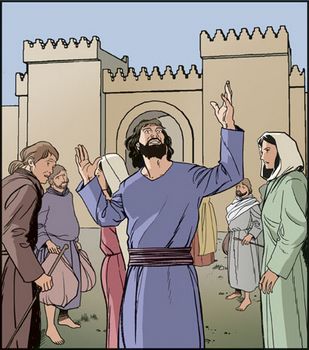 The drama of this life is not only in the events in which Jeremiah is involved; it is also in the prophet himself. He has a tender soul, made for love, yet he is sent “to root up, and pull down, and to waste, and to destroy” (Jer 1:10). He principally has to foretell misfortune (Jer 20 :8). He wants peace yet he always has to fight, against his own, against the kings, the false prophets, all the people. In his contemporaries’ eyes, he is “a man of strife, a man of contention to all the earth” (Jer 15:10). He is torn by the mission which he cannot escape (Jer 20:9). His interior dialogues with God are sown with cries of pain: Why is my sorrow become perpetual? (Jer 15 :18). And the poignant passage which Job announces, Cursed be the day wherein I was borne… (Jer 20 :14). But that suffering purified his soul and opened it up to divine commerce.
The drama of this life is not only in the events in which Jeremiah is involved; it is also in the prophet himself. He has a tender soul, made for love, yet he is sent “to root up, and pull down, and to waste, and to destroy” (Jer 1:10). He principally has to foretell misfortune (Jer 20 :8). He wants peace yet he always has to fight, against his own, against the kings, the false prophets, all the people. In his contemporaries’ eyes, he is “a man of strife, a man of contention to all the earth” (Jer 15:10). He is torn by the mission which he cannot escape (Jer 20:9). His interior dialogues with God are sown with cries of pain: Why is my sorrow become perpetual? (Jer 15 :18). And the poignant passage which Job announces, Cursed be the day wherein I was borne… (Jer 20 :14). But that suffering purified his soul and opened it up to divine commerce.
What is remarkable about Jeremiah is the source from which he draws to address not only his contemporaries but also us today. He does not say: “Thus speak the polls”, which would enable him perhaps to be appreciated by his peers, or indeed “thus the majority want”, or “thus speaks the labor union”, or “thus speaks my political party”, or even “it is the strongest law which must be applied”, “it is forbidden to forbid” and “do everything you want to do”, but he says, he proclaims, against the tide: “Thus saith the Lord”. It is the Word of God which he is made of, which shapes him, directs him, despite suffering and persecution. By putting spiritual values first, revealing the intimate relationship that the soul must have with God, Jeremiah is preparing the Christian New Covenant. His life of sacrifice and suffering in the service of God makes Jeremiah a figure of Christ.
To put his will in that of the Father
Let us now reread article 10 of our Rule. He does not lie, does not tell romantic stories straight from the imagination and only capable of staying there, with no relation to real life. It is a question of obedience, of communion with Jesus’ redeeming obedience; it is necessary to put your will in that of the Father, fulfill with faithfulness your commitments. In short, follow the Word made flesh, the Word of the Lord. Francis, in his letter to the entire order, exhorts us in the same way and even specifies how we should receive this word of God and what we should do with it: Incline the ear of your heart and obey the voice of the Son of God (3 Let 6). Francis insists immediately after, because it is not only about lending the tender ear to the Word, but to make it one’s own by fulfilling it: Keep with all your heart his commandments and fulfill perfectly his counsel (3 Let 7). In any event, these commandments and counsel to live by in the diverse situations of life must be experienced in communion with Jesus, because if he sent you all over the world, it is so that, in word and action, you bear witness to his word and you make it known to everyone that He is the only Almighty (3 Let 9). In so doing, we know what awaits us, the servant (me today) is not greater than his master (Christ poor and crucified) (John 15:20), even unto hardship and persecution, foretells our Rule. Does that mean that we must seek hardship and persecution? No, there is no need at all to seek them. They come to us without any effort on our part. But it must be reiterated that he who follows Christ must: 1/ renounce himself (which is already a “holy” difficulty), 2/ take up his cross each day (meaning have a spirit of self-sacrifice, capable of suffering for love of God and his sons, men), 3/ and finally, follow Christ the Savior. Francis encourages us: Persevere in discipline and in holy obedience: what you promised him, observe it with faithfulness and generosity (3 Let 10).
Article 14.
With all men of goodwill, they are called to “BUILD A MORE BROTHERLY, EVANGELICAL WORLD, so that God’s reign may come. Mindful that “anyone who follows Christ, the perfect man, becomes more of a man himself”, let them exercise their responsibilities competently in Christian spirit of service. * Vatican II, const. on the Church 41 ; Const. on the Church in the world of this time 93.
With all men of goodwill
To define goodwill, we must first speak about freedom. “Freedom is the power, rooted in reason and will, to act or not to act, to do this or that, and so to perform deliberate actions on one's own responsibility. By free will one shapes one's own life. Human freedom is a force for growth and maturity in truth and goodness; it attains its perfection when directed toward God, our beatitude” * CCC 1731.
Saint Mary Magdalene, the sinner of seven demons, had chosen the slavery of sin. She was a prostitute. Touched by the Good Shepherd’s voice, the lost sheep converts and looks for God. She has the will to make this search. It is always the will which gives the action its value. Liturgy proposes, for the feast day of Saint Mary Magdalene, readings which relate well this search for good, i.e. this deliberate goodwill to turn one’s heart towards God and to put order into one’s daily actions. We will see that this search does not succeed without effort: “In my bed by night I sought him whom my soul loveth: I sought him, and found him not. I will rise, and will go about the city: in the streets and the broad ways I will seek him whom my soul loveth […] I found him whom my soul loveth: I held him: and I will not let him go. * Sg 3 :1-4a (reading on the feast day of Saint Mary Magdalene).” When one has found Christ, He who is all good without whom there is no good, not only does our world vision change, but the world itself is transformed: And Christ died for all; that they also who live, may not now live to themselves, but unto him who died for them, and rose again. Wherefore henceforth, we know no man according to the flesh… If then any be in
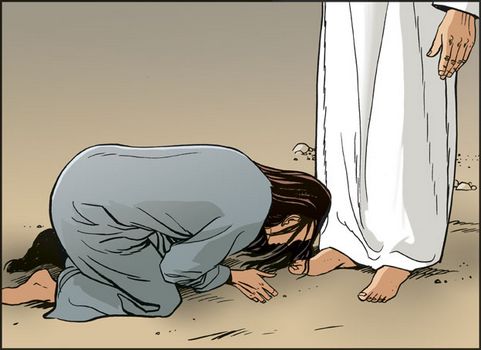
Christ a new creature, the old things are passed away, behold all things are made new * 2 Cor 5 :14-17 (reading on the feast day of Saint Mary Magdalene).. The building of this new world cannot however be done without my brothers. It must be built with all men of goodwill, i.e. with all those who are thirsty for him, with all those who contemplate him, with all those who bless him, with all those who attach their souls to him * From Psalm 62 (psalm on the feast day of Saint Mary Magdalene).. It is then for us all, men called to Good Will, that Mary Magdalene, in the early morning coming back from him, announces to us: “I have seen the Lord, and these things he said to me. * John 20:18 (gospel on the feast day of Saint Mary Magdalene).”
Stay where you are
This order from Francis: “stay where you are”, could seem contradictory to the passage in the Song of Songs which we just read: I will rise, and will go about the city: in the streets and the broad ways. There is no conflict in these texts since, with the help of imagery, the Song of Songs describes necessary effort, progress in virtue, knowledge of good, and asceticism, which all make one free with true freedom. As for the “stay where you are”, it tells us the place to work in the vineyard of the Lord. Let us recall in this regard the sentence of our Supreme Pontiff Pius XII, “The Faithful, more precisely the lay faithful, find themselves on the front lines of the Church's life.” * Cf . Ibid
Saint Francis created the order of Penitents in 1221. It concerned men and women who, after having long nourished their appetite for earthly food, had found the opportunity for a new birth in Francis’ doctrine, but without going as far as renouncing their responsibilities in the world and taking the vow of absolute poverty. It is to us, his brothers in the Secular Franciscan Order, that Francis says, “Do not rush to leave your homes. Stay where you are, and I will tell you what you need to do for the salvation of your souls” (Fior 16:9). Let us note in passing that Francis does not tell us, “I will tell you what you need to do to put the world right.” But rather Francis knows that with the conversion of each and everyone begins the only true reform of society, the only true building of a more brotherly, evangelical world.
Water changed into wine : building a brotherly, evangelical world
Building a more brotherly, evangelical world is like Christ changing water into wine in our daily life. Before Jesus was present at the wedding in Cana, marriage already existed. This is evidenced by the fact that Jesus and Mary were indeed invited to the wedding.
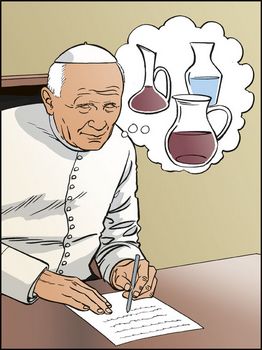 But the presence of Christ changes the usual process. Ordinarily water is not changed into wine; besides, we always begin by serving the best wine and then, when the guests have drunk well, we bring out wine of a lesser quality. Jesus upsets the order of things: he changes water into wine, meaning that what was simply thirst-quenching (water) becomes a drink worthy of being served to wedding guests (wine). It is not the only upset he brings about. As aforementioned, usually we begin by serving the good wine before the guests are tipsy and then, once they are, fooling them by serving the less good wine. Jesus, though, serves the best wine at the end. His presence at the wedding signifies that he does not reject the world but transforms it by working towards the ultimate goal: the celestial wedding. We are, in fact, called to do the same thing because building a more brotherly, evangelical world is changing water into wine. Does this transformation seem impossible to do? Does it seem ineffective? Our Supreme Pontiff John Paul II, in his encyclical letter, « Sollicitudo Rei Socialis » (the social question), encourages us in this path: However imperfect and temporary are all the things that can and ought to be done through the combined efforts of everyone and through divine grace, at a given moment of history, in order to make people's lives "more human," nothing will be lost or will have been in vain. This is the teaching of the Second Vatican Council, in an enlightening passage of the Pastoral Constitution Gaudium et Spes: "When we have spread on earth the fruits of our nature and our enterprise - human dignity, fraternal communion, and freedom - according to the command of the Lord and in his Spirit, we will find them once again, cleansed this time from the stain of sin, illuminated and transfigured, when Christ presents to his Father an eternal and universal kingdom... here on earth that kingdom is already present in mystery" * Gaudium et spes, n. 39..
But the presence of Christ changes the usual process. Ordinarily water is not changed into wine; besides, we always begin by serving the best wine and then, when the guests have drunk well, we bring out wine of a lesser quality. Jesus upsets the order of things: he changes water into wine, meaning that what was simply thirst-quenching (water) becomes a drink worthy of being served to wedding guests (wine). It is not the only upset he brings about. As aforementioned, usually we begin by serving the good wine before the guests are tipsy and then, once they are, fooling them by serving the less good wine. Jesus, though, serves the best wine at the end. His presence at the wedding signifies that he does not reject the world but transforms it by working towards the ultimate goal: the celestial wedding. We are, in fact, called to do the same thing because building a more brotherly, evangelical world is changing water into wine. Does this transformation seem impossible to do? Does it seem ineffective? Our Supreme Pontiff John Paul II, in his encyclical letter, « Sollicitudo Rei Socialis » (the social question), encourages us in this path: However imperfect and temporary are all the things that can and ought to be done through the combined efforts of everyone and through divine grace, at a given moment of history, in order to make people's lives "more human," nothing will be lost or will have been in vain. This is the teaching of the Second Vatican Council, in an enlightening passage of the Pastoral Constitution Gaudium et Spes: "When we have spread on earth the fruits of our nature and our enterprise - human dignity, fraternal communion, and freedom - according to the command of the Lord and in his Spirit, we will find them once again, cleansed this time from the stain of sin, illuminated and transfigured, when Christ presents to his Father an eternal and universal kingdom... here on earth that kingdom is already present in mystery" * Gaudium et spes, n. 39..
So that God’s reign may come
The Church knows well that no temporal achievement is to be identified with the Kingdom of God, but that all such achievements simply reflect and in a sense anticipate the glory of the Kingdom, the Kingdom which we await at the end of history, when the Lord will come again. But that expectation can never be an excuse for lack of concern for people in their concrete personal situations and in their social, national and international life, since the former is conditioned by the latter, especially today. * John-Paul II, Encyclical Sollicitudo Rei Socialis, § 48, Editions Pierre (Pierre (Peter) Editions) TEQUI 1987.
Moreover, is not God made man! The New Testament finds its context in a specific social climate, with its setting of a carpenter’s workshop, and for characters, small landowners, farmers, merchants free to buy and sell, soldiers, magistrates and bureaucrats. An official decree was needed so that Mary and Joseph go to the place where Christ was to come into the world; but keep in mind that nowhere in the Gospel is found a denunciation of the imperial power as such. In the same vein, when Jesus laments the fate of the rich young man, it is not because the young man is rich but because he did not know how to receive the grace of the vocation of poverty. In the same way, in the parables, the vineyard owner has the right to determine himself the legitimate salary he will pay to his workers without having to consult any official organization whatsoever. When Paul writes to Philemon asking him to welcome a fugitive slave with Christ’s charity, he does not engage in any condemnation of slavery.
The New Testament does not give any precise instructions about social problems. Neither moreover does our Rule of life. The Gospel is not a manual of social morals: it does not make any mention of the political economy, nor of democracy or the working class, state property or hospitals. But it is inspired by an authentic revolutionary dynamic, by a power capable of transforming men and society, and of shaping a new world finally true to God’s justice: with all men of goodwill, the secular brothers of Saint Francis are called to build a more brotherly, evangelical world, so that God’s reign may come.
Jesus said everything there was to say concerning the political economy when he gave us the principle that our Father in Heaven knows what we need in regard to food and clothes. For a radical program of reform is implied by the commandment: “But seek first the kingdom (of God) and his righteousness, and all these things will be given you besides.” (Mt 6:33). Let us not be impatient. And let us not falsify the Word of the Lord as follows: “May we first build a suitable economy, and the utopian kingdom proclaimed by Christians will naturally follow”. * The contents of this paragraph were composed of paraphrased extracts from Editions franciscaines (Franciscan editions) 1964, God gave me brothers…, Sidney F. Wicks, pp. 144 à 150 (Revelation and revolution) as well as the work of reflection and meditation printed by OCEP 1975, Divino-human Sociology of Christ in the Gospel through Saint John – Christ at work, Brother Raymond Moisdon. ofm. In many non-Christian circles, Christianity would then be a “paralyzing illusion”, even though the aim may be to improve the human condition. It is the “opium of the people”, maintained Karl Marx. However the proclamation of the Gospel is not opium but, when reaching humanity, it is the spiritual dynamite which explodes from on high and for on high.
Jesus Christ dies on the cross declaring, “I am thirsty.” As with the Samaritan woman, he declares to men his thirst for souls seeking fulfillment. As with the Samaritan woman, he reveals to all humanity his “own thirst” for fulfillment, as well as its source, “HIMSELF”. And so he does not hesitate to call us, “As my Father sent me, I too send you.” I send you to personally recreate the friendship between each of us and God.
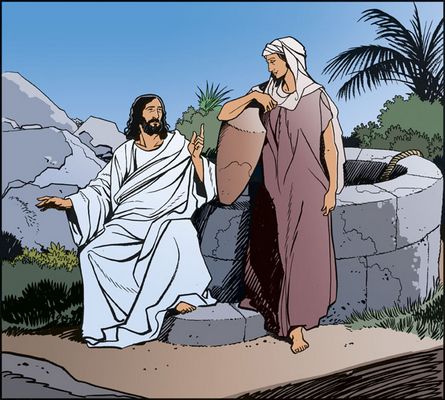
Follow Christ and you will become more of a man
To become more of a man, our Rule specifies the necessity of following Christ. Is it not amazing, that call to follow God made man, so as to become ourselves men worthy of the name? In other words, if you want to become more of a man, follow God made man’s actions. But these actions, what are they? And moreover, what are they built on? * The lines which follow are extracted from Desclée de Brouwer 1997, When Love was made man, Stan Rougier, pp. 43 à 47.
God is Love. In the Gospel, little by little, Jesus reveals his secret : he comes from a world where love is the only law, the only desire, the only life. He is the “Beloved” of the Father whose love is inexhaustible, without limit. Love is not a sigh, a slight or passing feeling. Love is the Infinite, it is the Absolute; it is the beginning and end of everything. In the beginning was Love. Love is the union of the eternal Father and his eternal Son in the dazzling glow of the Spirit. This decisive revelation will be made with the greatest discretion. Jesus will not say, “I am the second person of the Trinity.” He leaves to his disciples the task of drawing the consequences of his words, his resurrection, the descent of the Holy Spirit after his “departure”.
To enter the Kingdom where we will all love each other, we must chase from our heart that which injures love, which kills the being who is loved : “Love and you will live”, “Love and you will give life”. Jesus never moves away from these two thoughts which are integral to him. And so he will say and show what the verb to love means.
For Jesus, to love is not like picking the petals off the daisy repeating, “I love you , a little, a lot, passionately, madly…” For Jesus, loving is translated by the quality of the look. Under the tiniest seed, he recognizes the tree where birds will one day shelter. “If you knew the beauty of a single human soul, I do not doubt that you would be ready to die a hundred deaths for its salvation. Nothing is comparable to that beauty (Catherine of Siena).
For Jesus, to love consists in sharing his bread with the hungry, his clothes with the unclothed, his house with the homeless, his reputation with he who is dishonored, his work with the unemployed. To love is to spend an afternoon with a sick person or a man in prison. For Jesus, to love is to come to the defense of a woman condemned by the law to execution. It is to offer his friendship to a tax inspector, dishonest and detested, at the risk of losing his credit with many. For Jesus, to love is to welcome, during an official banquet, a woman of disrepute whose actions seriously compromised his reputation as spiritual master. It is to kiss with wonder noisy and tiring kids. For Jesus, to love is to spend time as much with the occupying enemy as with the resistant, the intellectual as well as the manual worker, the miscreant as well as the right-thinking. The worst will always be the most loved, not because they are the worst, but so that they will no longer be the worst. Like the sickest child will always receive the most care in order for him to be healed. Let there be no misunderstanding, Jesus is not at all complicit with embezzlement, sexual freedom or the alienating power of Rome. Though the state of sin repulses him, the slightest change on the part of a sinner gives him his greatest joy.
For Jesus, to love is to interrupt a trip for an unknown wounded person, take him to the hospital and say, “Send me the bill.” For Jesus, to love is to welcome back a runaway reveller of a son with tears of joy, without a word of blame. It is to confide an apostle’s mission to a Samaritan whose life is far from exemplary. For Jesus, to love is to forgive his torturers… not twenty years later, but indeed at the time of the torture, “Father, forgive them. They know not what they do!” For Jesus, to love is to be, for his fellow man, what the sun and water are for plants. Light and rain impose nothing on the plant. They enable them only to exist, “according to their species”.
Where does Jesus draw the secret of his love from? Who then is this man who loves those who no one dares approach? The answer to these questions is given to us by Jesus
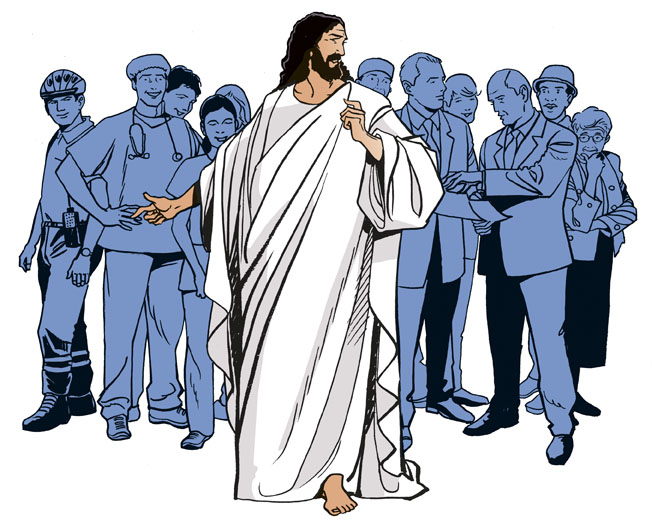
Himself, “Be you therefore perfect, as also your heavenly Father is perfect. That you may be the children of your Father who is in heaven, who maketh his sun to rise upon the good, and bad, and raineth upon the just and the unjust.” (Mt 5 :48 and 5 :45).
In a Christian spirit of service
“Where is your brother Abel?” (Gen 4:9), the Lord asks each of us. It is now easy to imagine that the right answer to that question is not really what Cain said, “I do not know. Am I my brother’s keeper?” To carry out our own responsibilities competently in our professional, social, political, family life, etc., that is the answer to the Lord’s question, “where is your brother?”, through words and actions which take into account the “final beneficiary” of the service rendered: my brother, son of the same Father. In the preceding paragraph, we discovered many ways of expressing the verb love. In relation to our own responsibilities, it is the desire to follow Christ: “Whoever serves me must follow me, and where I am, there also will my servant be.”(John 12:26). Jesus does not give us what could be seen at face value as a simple written process, but rather he gives us instructions for Christian service which turns upside down traditionally accepted values. Indeed, to competently carry out our own responsibilities could easily bring about, for those whose responsibilities are those of an employer, or on the executive council, or head of a department, or the journeyman helped by his apprentice (for we are all “responsible” for someone else), a feeling of superiority leading them to believe that a true relationship consists of: “I give the orders; you obey.” Obviously the Christian spirit of service does not take away from the person in charge of a responsibility the unavoidable decisions he must make and assume. But he must do it in the spirit of Christ the servant. “For who is the greater: the one at table or the one who serves? The one at table, surely. Yet here am I among you as one who serves!”(Luke 22 :27). Enlightened by what was previously said, could we not as easily translate it by, “Yet here am I among you as one who loves!...”
Article 15.
Through the testimony of their own lives and courageous initiatives, both individual and collective, may they be in the forefront in promoting justice, particularly in public life, and not hesitate to commit to this through choices that are concrete and in harmony with their faith. * Vatican II, décree on the laymen’s apostolate 14.
By the testimony of his own life
Is it not amazing that article 15 of our rule distinguishes the testimony of their own lives from brave initiatives, as if the second was not representative of the first! If the distinction is made, is it not to underline the fact that there is, in the testimony of their own lives, something which encompasses and even surpasses the works which can be accomplished in the time which is given to us to live? In the first pages of this chapter, we read a paragraph which perfectly explains this nuance: everything you say, everything you do, may it always be in the name of the Lord Jesus Christ by offering through Him our thanks to God the Father. The first and fundamental vocation that the Father offers to each layperson in Jesus Christ through the intermediary of the Holy Spirit is the vocation to holiness, i.e. the perfection of charity. The saint is the most resounding testament to the dignity conferred on Christ’s disciple.
So must we testify by instigating revolution? Must be somehow take on earthly power to succeed in putting into place (and in imposing) that which is good and just?
The New Testament is entirely centered on Revelation. It has nothing to teach us about revolution.
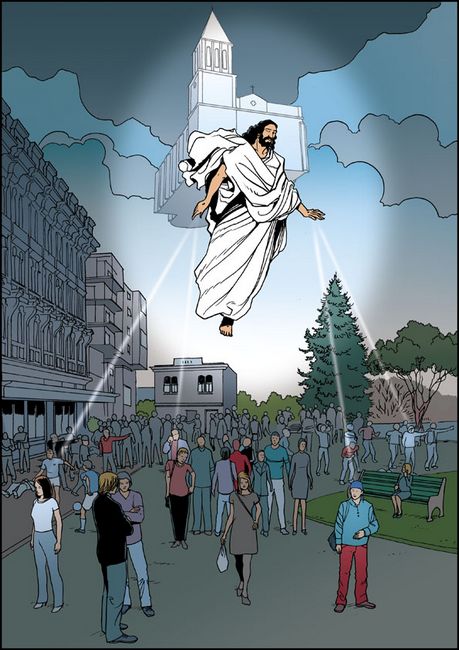
When Christ sends his Spirit to the Church which has just been born, it is not to open up a way to the accession of power. But the coming of a saint capable of giving meaning to men’s lives is worth a hundred concordats, even though concordats are necessary. And the secret of the Spirit’s power is that he operates by a slow transmutation, not by brutal reform. This transmutation is the fruit of grace, whereas brutal reforms most often amount to grafting a new branch onto a vine without sap. It is then not by revolt against those who govern that nations become great and free, but by the holy conduct of its citizens through whom we obtain the Lord’s help. For that is indeed the statute of Christ’s kingdom: not revolt, it does not save; but the sanctification of authority by imbuing it with our holiness.
It is up to us to respond to the Lord’s call to go work in his vineyard. It is up to us to be saints. More personally, to me today and until my death, it is up to me to be a saint.
Through brave initiatives
The Church finds its deep vitality in the power of the gifts granted to it through the Holy Spirit. No legislation, as democratic as it could be, could bring anything to the Church in the matter of holiness. Like holy Jerusalem in Saint John’s vision, the Church descends from heaven. It is God’s gift. It is the body of Christ. So truly, the creature disappearing into the creator, it is the creator who acts, and He is infinite.
We are strongly urged to witness through our own lives (of holiness), grafted as we are from on high, but also to testify through brave initiatives. But why does the promotion of justice demand courage?
It is important to recall the etymology of the word courage to help us understand what we are talking about. The word courage is an old derivation of heart. Courage is that firmness of heart, that force of soul which braves danger, which enables us to bear suffering and setbacks steadfastly. Article 15 of our Rule, directly extracted from the decree of the laymen’s apostolate (Vatican II), signifies well that wanting to stand up for justice, particularly in the domain of public life, requires courage. Current news events are unfortunately very eloquent about the non respect of moral virtue named justice. Everybody demands justice, for their own rights, often forgetting that justice is the respect of the rules of duty. Taking initiatives to promote justice is to attract trouble. The Lord himself warns us what is in store for us, “If the world hates you, you must realise that it hated me before it hated you. If you belonged to the world, the world would love you as its own; but because you do not belong to the world, because my choice of you has drawn you out of the world, that is why the world hates you. Remember the words I said to you: A servant is not greater than his master. If they persecuted me, they will persecute you too; if they kept my word, they will keep yours as well. But it will be on my account that they will do all this to you, because they do not know the one who sent me.”(John 15:18-21).
Promoting justice
But alas for you Pharisees, because you pay your tithe of mint and rue and all sorts of garden herbs and neglect justice and the love of God! These you should have practiced, without neglecting the others. (Luke 11 :42). Go and learn the meaning of the words, ‘I desire mercy, not sacrifice’ (Mt 9 :13), knowledge of God rather than burnt offerings. (Hos 6:6). God does not then reject human justice, which we could translate as the respect of the rules of duty: “these you should have practiced.” These “small rules” are actually very important for, thanks to the masters’ justice, the servants and manservants also become just. In the daily “little things”, we are thus given the choice “to be sons of the Father” or “to be sons of the devil”; “those who enlighten” or “those who bring about the downfall” of their brothers. But the Lord insists on the fact that we must not abandon the rest. We could translate “the rest” by promoting justice, especially in the domain of public life to which we invite our Rule, knowing that this rest must be filled with mercy: “I desire mercy, not sacrifice.”
Our Supreme Pontiff John-Paul II, in his message of January 1, 2002 for the celebration of the international day of peace, summarizes with clarity this mercy which must necessarily accompany justice: there is no peace without justice; there is no justice without forgiveness.
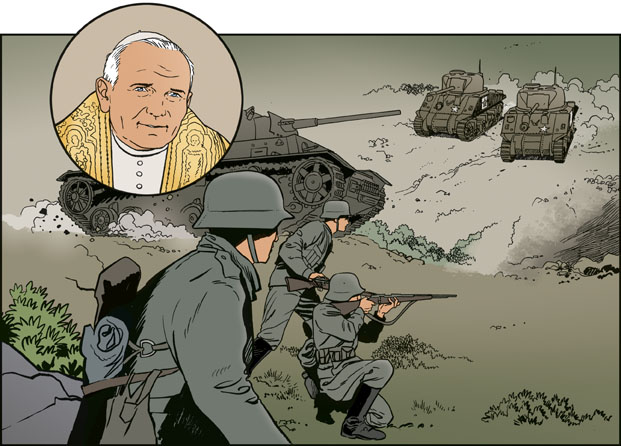 Let us look at here, by way of commentary on the concept, promotion of justice, several lines from this message, itself presented in the form of a moving testimony.
Let us look at here, by way of commentary on the concept, promotion of justice, several lines from this message, itself presented in the form of a moving testimony.
Peace, the work of justice and love : Recent events * The international day of Peace, January 1, 2002 was celebrated in the shadow of the dramatic events of 11 September last. On that day, a terrible crime was committed: in a few brief hours thousands of innocent people of many ethnic backgrounds were slaughtered (first lines from the pontifical message).… move me to return to a theme which often stirs in the depths of my heart when I remember the events of history which have marked my life, especially my youth.
The enormous suffering of peoples and individuals, even among my own friends and acquaintances, caused by Nazi and Communist totalitarianism, has never been far from my thoughts and prayers. I have often paused to reflect on the persistent question: how do we restore the moral and social order subjected to such horrific violence? My reasoned conviction, confirmed in turn by biblical revelation, is that the shattered order cannot be fully restored except by a response that combines justice with forgiveness. The pillars of true peace are justice and that form of love which is forgiveness.
But in the present circumstances, how can we speak of justice and forgiveness as the source and condition of peace? We can and we must, no matter how difficult this may be; a difficulty which often comes from thinking that justice and forgiveness are irreconcilable. But forgiveness is the opposite of resentment and revenge, not of justice. In fact, true peace is “the work of justice” (Is 32:17). As the Second Vatican Council put it, peace is “the fruit of that right ordering of things with which the divine founder has invested human society and which must be actualized by man thirsting for an ever more perfect reign of justice” (Pastoral Constitution Gaudium et Spes, 78). For more than fifteen hundred years, the Catholic Church has repeated the teaching of Saint Augustine of Hippo on this point. He reminds us that the peace which can and must be built in this world is the peace of right order—tranquillitas ordinis, the tranquillity of order (cf. De Civitate Dei, 19, 13).
True peace therefore is the fruit of justice, that moral virtue and legal guarantee which ensures full respect for rights and responsibilities, and the just distribution of benefits and burdens. But because human justice is always fragile and imperfect, subject as it is to the limitations and egoism of individuals and groups, it must include and, as it were, be completed by the forgiveness which heals and rebuilds troubled human relations from their foundations. This is true in circumstances great and small, at the personal level or on a wider, even international scale. Forgiveness is in no way opposed to justice, as if to forgive meant to overlook the need to right the wrong done. It is rather the fullness of justice, leading to that tranquility of order which is much more than a fragile and temporary cessation of hostilities, involving as it does the deepest healing of the wounds which fester in human hearts. Justice and forgiveness are both essential to such healing.

To commit oneself to choices in line with one’s faith
No revolution; no revolt, we said above, but brave initiatives. In a world of constant change, the dispositions taken one day for the promotion of justice can become unsuitable the next merely because times evolve and, in and of itself, modify sometimes profoundly our way of life. It is often necessary to invent, or more simply reinvent, new processes, incite new measures, sign new concordats. But be aware of the dangers of worldly immersion! To avoid the pitfalls, let us take the example of Francis. He is far from being a stranger to the preoccupations of his time. Quite the reverse, Francis meets and takes on those concerns. * The rest of this § is composed of extracts from Desclée De Brouwer 1981, Francis of Assisi, Return to the Gospel, Eloi Leclerc, pp. 125 à 148. He is not however, inspired by a considered will for reform. Hence no doubt that clarity of source which is uniquely his. “A particular and thoughtful will,” remarks P. Lippert, “almost always has the effect of disturbing life, of making it less pure. The desire to succeed at all costs, to reform, protest, fight whoever, that will is rarely exempt from selfishness and self-love, of violence and hardness of heart; that is why it weakens and dirties the life for which it pretends to fight. There where, to the contrary, true gushing life can remain fully itself, there where it can affirm, construct, bless and give, then it can enjoy at that moment an incredible freedom * P. Lippert : Goodness, Paris, 1946, pp. 115-116....”
It will always be necessary to choose between a society which has as its objective to govern and subjugate its citizens, and a society which offers above all to serve them and provide fulfillment. The first type of society exhausts individuals so as to make them instruments of a policy or ideology; the second sees in each person a unique value to promote: each human being represents here an original life, which has its own law of growth. Francis chooses the second type of society, the only one in reality which is right for a brotherhood. On this point like so many others, he is open to the profound aspirations of his time.
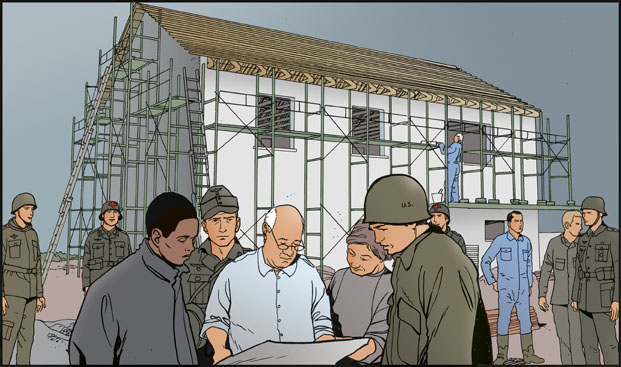
The freedom to live according to the Holy Gospel, following the Lord’s inspiration, was something Francis never stopped claiming for himself and his brothers. He respects that aspiration in each of them. There is no question for him of imposing a model nor of governing, but of permitting the most humble of brothers to run also in the adventure of the Kingdom, to open up freely to the Spirit of the Lord and to let himself be lead by him. “It is the Holy Spirit,” he says, “who is the general minister of the Order. And he rests on the poor and the simple as much as on the others” (2 C 193). “May the brothers consider that they must above all desire to have the Holy Spirit and to let him act in them (2 Rule 10:9).”
We have a particularly illuminating example of Francis’ way of proceeding in the letter that he addressed to Brother Leo. This latter had consulted him in person on a point of observance. This is what Francis wrote to him, “Brother Leo, your brother Francis sends you greetings and peace! My son, I am speaking to you like a mother to her child. Everything that we said while travelling, I will summarize in one sentence and in one piece of advice… Whatever way seems to you best for pleasing the Lord God and following in his footsteps and poverty, do it with the blessing of the Lord God and my permission…”
Article 16.
Let them esteem work as both a gift and a sharing in the creation, redemption, and service of the human community. * Vatican II, const. on the Church in the world of that time 67:2; Saint Francis, 1 Rule 7:4; 2 Rule 5:1.
Saint Joseph, craftsman, protector of the world of work
Model of work, faithfulness, devoutness, craftsman that was Saint Joseph, virginal Father of God, he was predestined to become the protector of the world of work. * The recognition of Joseph’s greatness was explicitly perceived in the Gospel little by little. The great feast day of Saint Joseph, March 19, dates only from the XVth century. We recognize in him today a remarkable protector of the Church. The proclamation of Joseph as patron of the universal Church dates from December 8, 1870.. “Isn’t he the carpenter’s son ?”, was asked about the Savior. Joseph, known in Nazareth as Mary’s husband and Jesus’ father * Several theologians, of whom Suarez, noted that Saint Joseph occupies a place of his own in the annals of holiness: while the other saints played a role in service to the Church, mystical Body of Christ, Joseph is, like Mary, placed in the ministry itself to the Son of God in the mystery of his Incarnation., a just man, wise and prudent, patient and good, with no other income than from his trade, Joseph, this fugitive from greatness, appears to us as the worker’s perfect model according to God’s Heart.
The childhood narratives from the first gospel are centered on the person of Joseph who, in the Holy Family, always has an active role. Joseph without fail shows a silent total submission to God’s will, even in his night of faith, for God does not work any wonders to help him in his task. And Joseph submits himself without comment; not a word of Joseph’s was conserved for us; he obeys God without question. No one more than him (apart from the Virgin Mary) let himself be lead as docilely by the Holy Spirit. * From P. André Feuillet, P.S. Sulp., The Messianic Savior and His Mother in the Childhood Narratives of Saint Matthew and Saint Luke, Divinitas from January 1990, p. 150.
We will ask, then, Saint Joseph to accompany us in our brief commentaries which follow.
Work is a gift
The sign of man’s familiarity with God is that He places him in the garden. He lives there “to cultivate and care for it.” (Gen 2 :15). 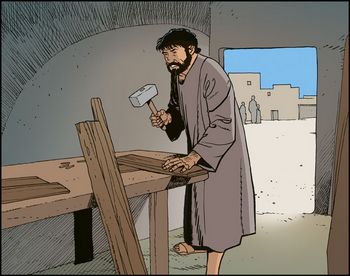 In the beginning, work is then a gift that the Lord gives to man. The Lord strongly invites us to accept it, “You go into my vineyard too.” If this invitation greatly surpasses the category of social work, human work is part of man’s response to God. For work is also a gift, an offering, that man renders to God.
It is the second meaning of the gift : « Hence the laity, dedicated as they are to Christ and anointed by the Holy Spirit, are marvelously called and prepared so that even richer fruits of the Spirit may be
In the beginning, work is then a gift that the Lord gives to man. The Lord strongly invites us to accept it, “You go into my vineyard too.” If this invitation greatly surpasses the category of social work, human work is part of man’s response to God. For work is also a gift, an offering, that man renders to God.
It is the second meaning of the gift : « Hence the laity, dedicated as they are to Christ and anointed by the Holy Spirit, are marvelously called and prepared so that even richer fruits of the Spirit may be
produced in them. For all their works, prayers, and apostolic undertakings, family and married life, daily work, relaxation of mind and body, if they are accomplished in the Spirit - indeed even the hardships of life if patiently born - all these become spiritual sacrifices acceptable to God through Jesus Christ. In the celebration of the Eucharist these may most fittingly be offered to the Father along with the body of the Lord. And so, worshipping everywhere by their holy actions, the laity consecrate the world itself to God, everywhere offering worship by the holiness of their lives. * CCC 901."
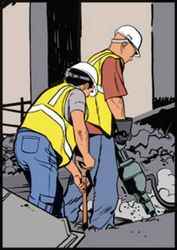 Like Saint Joseph the craftsman, let us fill our work with faith, hope and charity so as to obtain this divine transfiguration of our ordinary tasks. This supernatural spirit will steer us clear of discontent and bad moods. As in the example of the holy Patriarch, may prayer join with our work so that our work becomes prayer.
Like Saint Joseph the craftsman, let us fill our work with faith, hope and charity so as to obtain this divine transfiguration of our ordinary tasks. This supernatural spirit will steer us clear of discontent and bad moods. As in the example of the holy Patriarch, may prayer join with our work so that our work becomes prayer.
Work is a means of participating in the creation
Human work proceeds directly from persons created in the image of God and called to prolong the work of creation by subduing the earth, both with and for one another. That is what Genesis strongly indicates, “God created man in his image […], male and female he created them. God blessed them, saying: "Be fertile and multiply; fill the earth and subdue it.” (Gen 1 :27-28). Hence work is a duty: "If anyone will not work, let him not eat." (2 Th 3 :10) the apostle tells us. Francis himself will add in his testament,
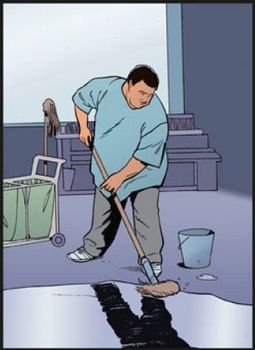 « ... I want to work ; and all the brothers, I firmly want them to have honest work. Those who do not know how to work, that they learn, not for a greedy desire to receive a salary, but as a good example and to chase away idleness» (Test 20-22). We see by this that we should not reduce the notion of work to just professional paid work. Work is also done as a good example the mother gives to her children by actively taking care of the home ; the work done to dispel the idleness of the young teenager who helps his parents or his friends in the various chores of daily life; the work done as a good example and to dispel the idleness of that man hit by economic unemployment * There is no question here of dealing with this formidable problem of economic unemployment. Simply a true anecdote to show what actions are sometimes put into place to fight against some of the possible harm of economic unemployment (and not initially against unemployment itself). In some big urban areas, certain families are struck by unemployment for several generations, i.e., some do not work from “father to son”. The considerable repercussions of an idle father at home continue on to new generations. Some organizations have put workshops into place to get the head of the family out of the house from early morning to teach him the rudiments of a job (that he would not after all be able to do at the end of the training period for numerous other reasons, but that is not the first objective). Just the fact of getting up early obliges the head of the family to go to bed early. He can no longer watch television drinking alcohol until two o’clock in the morning with all his children that have not been sent to bed and who are there, dozing in front of the television. If the head of the family shows the example, goes to bed at a reasonable hour, he will be able to ask his children to do the same. These latter would then have a more balanced life and hence would have new skills in their future life. Later, their father’s example will serve as a reference in their family and professional life.. Work honors the Creator's gifts and the talents received from him. * CCC 2427 Work is not a burden, but rather the collaboration of man and woman with God in perfecting visible creation. * CCC 378.
« ... I want to work ; and all the brothers, I firmly want them to have honest work. Those who do not know how to work, that they learn, not for a greedy desire to receive a salary, but as a good example and to chase away idleness» (Test 20-22). We see by this that we should not reduce the notion of work to just professional paid work. Work is also done as a good example the mother gives to her children by actively taking care of the home ; the work done to dispel the idleness of the young teenager who helps his parents or his friends in the various chores of daily life; the work done as a good example and to dispel the idleness of that man hit by economic unemployment * There is no question here of dealing with this formidable problem of economic unemployment. Simply a true anecdote to show what actions are sometimes put into place to fight against some of the possible harm of economic unemployment (and not initially against unemployment itself). In some big urban areas, certain families are struck by unemployment for several generations, i.e., some do not work from “father to son”. The considerable repercussions of an idle father at home continue on to new generations. Some organizations have put workshops into place to get the head of the family out of the house from early morning to teach him the rudiments of a job (that he would not after all be able to do at the end of the training period for numerous other reasons, but that is not the first objective). Just the fact of getting up early obliges the head of the family to go to bed early. He can no longer watch television drinking alcohol until two o’clock in the morning with all his children that have not been sent to bed and who are there, dozing in front of the television. If the head of the family shows the example, goes to bed at a reasonable hour, he will be able to ask his children to do the same. These latter would then have a more balanced life and hence would have new skills in their future life. Later, their father’s example will serve as a reference in their family and professional life.. Work honors the Creator's gifts and the talents received from him. * CCC 2427 Work is not a burden, but rather the collaboration of man and woman with God in perfecting visible creation. * CCC 378.
The carpenter from Nazareth, by transforming some tree trunks into a framework for a building or into furniture, exemplifies man’s reign over creation. We do not find in the created world readymade carpenters, for example. But the intelligent and measured submission of what nature offers us (the trees that we cut and the young shoots that we replant afterwards to replace the cut trees) bring about human participation in creation. We are not always conscious of the dignity of human work, of its importance in the participation in creation.
 The liturgy, however, proclaims this dignity, “God, you formed man in your own likeness and set him over the whole world to serve you, his creator, and to rule over all creatures.” * Eucharistic prayer IV This dignity of human work stands out so clearly in the rite of preparation of the gifts, “Blessed are you, Lord, God of all creation. Through your goodness we have this bread to offer, which earth has given and human hands have made. […] Through your goodness we have this wine to offer, fruit of the vine and work of human hands…
The liturgy, however, proclaims this dignity, “God, you formed man in your own likeness and set him over the whole world to serve you, his creator, and to rule over all creatures.” * Eucharistic prayer IV This dignity of human work stands out so clearly in the rite of preparation of the gifts, “Blessed are you, Lord, God of all creation. Through your goodness we have this bread to offer, which earth has given and human hands have made. […] Through your goodness we have this wine to offer, fruit of the vine and work of human hands…
Work is a means of participating in redemption
Work can also be redemptive. By enduring the hardship of work “by the sweat of his brow” (Gen 3:14-19) in union with Jesus, the carpenter of Nazareth and the one crucified on Calvary, man collaborates in a certain way with the Son of God in his redemptive work. He shows himself to be Christ’s disciple by carrying the cross daily in the work he is called to accomplish. Work can be a means of sanctification and a way of enlivening earthly realities with the Spirit of Christ. * From CCC 2427 and 1609
The presence of Jesus in the workshop in Nazareth taught Saint Joseph the price of the tiring hours, and of hard labor accepted as reparation for man’s impudence in neglecting God’s laws. Craftsman with God creator, brother to Jesus’ toil who was his worker, associated with Him in the redemption of the world, Saint Joseph will never much attract the gaze and prayers of our century. That is why the Church, inspired by the Tradition which in the past baptized numerous pagan festivals to give them an all new Christian content, placed the civil work festivals under Saint Joseph’s powerful patronage. Worker all his life, who better than he gave thanks to God the Father in his every day labor? It is this modest craftsman that God chose to watch over the childhood of the Word made flesh come to save the world through the humility of the cross.
Work is service to the human community
In work, the person exercises and fulfills in part the potential inscribed in his nature. The primordial value of labor stems from man himself, its author and its beneficiary. Work is for man, not man for work. * CCC 2428
Participation is achieved first of all by taking charge of the areas for which one assumes personal responsibility: by the care taken for the education of his family, by conscientious work, and so forth, man participates in the good of others and of society. * CCC 1914
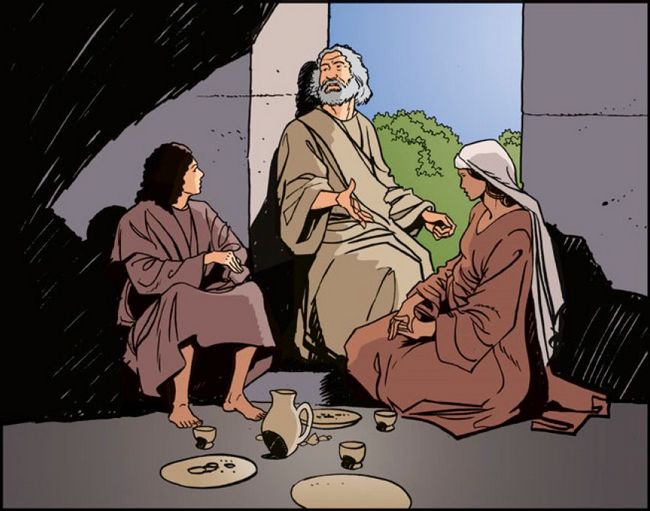
Diligence, application, constancy, serenity, abnegation, such are the qualities of a good worker. The concern for doing the Father’s will who said, “You will eat your bread by the sweat of your brow”, quickened Joseph the craftsman’s soul. Through his example, Joseph teaches us humility and joy in our finished work. When we have, as the apostle said, food and clothes, may we be content with that; may we value the necessary, without aspiring to the superfluous. Let us learn from the holy carpenter of Nazareth to see work, not as slavery, but as a privilege of greatness and nobility. Greatness and nobility for the soul, for work sanctifies man. Greatness and nobility for our own family, for honest work enables us to be a good example for our children and to provide for their needs. Greatness and nobility for the human community, for work serves to edify society for the happiness of all.
QUESTIONS
What did I retain?
- God’s Word is not necessarily easy to understand. Our intelligence can be « blocked » on one aspect or another ; our ego can even prevent us from receiving the essential message. What are the different meanings contained in God’s Word which, when we study it, enable us to understand this Word of God with all the force of our soul? Can I choose a text among the evangelical references proposed on the following page and search it for the different meanings of the Word?
- In Thomas of Celano’s narrative on Francis’ journey to Syria, can I recall the salient features of Francis’ motivation and behavior?
- Jeremiah, the Lord’s prophet, had the difficult mission of proclaiming God’s Word to his brothers. What is the introductory statement which reappears like a veritable leitmotiv in the prophet’s mouth before each of his interventions?
For further reflection
- The preparation rite of the gifts which open the Eucharistic liturgy begin with these words, « Blessed are you, Lord, God of all creation. Through your goodness we have this bread to offer, which earth has given and human hands have made. It will become for us the bread of life. » Again, a little further on, the priest says, « Blessed are you, Lord, God of all creation. Through your goodness we have this wine to offer, fruit of the vine and work of human hands. It will become our spiritual drink. » Why does the liturgy distinguish « the fruit of the earth and the vine » from « the work of human hands » ?
- Do I not sometimes want to dominate my neighbor in my conjugal, brotherly, friend, professional and other relationships? What effort must I make, what means must I use to change this instinct for domination which slumbers in me to a will for service? And who can help me in this daily conversion?
- You go into my vineyard too. ! When the Lord speaks to us he speaks to me. The “you” in the original text is plural, which carries a richness of meaning that we should especially not corrupt or conjure away. However, I can also translate this invitation so that it speaks to me, in which case the “you” plural becomes the “you” singular. That then gives this, “You (me personally) go into my vineyard too, so that God’s reign may come! How can I best respond in my daily life to this invitation from God?


